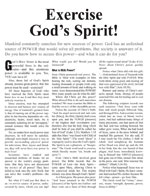At first inspection, I Kings 8:9 and Hebrews 9:4 seem to contradict each other. Hebrews states, “…wherein was the golden pot that had manna, and Aaron’s rod that budded, and the tables of the covenant.” I Kings 8:9 only lists the two tables on which the Ten Commandments were written. But remember, the Bible never contradicts itself.
In Hebrews 9:4, the word translated “wherein” comes from the Greek word Hou. Many concordances, including Strong’s Exhaustive Concordance, state that Hou means “at which place.” The original Greek word is more general in nature and simply means “in the same location.”
Understanding this, please read Deuteronomy 31:24-26: “And it came to pass, when Moses had made an end of writing the words of this law in a book [the civil law written by Moses—the law of Moses, not the Ten Commandments written by God on stone tablets], until they were finished, that Moses commanded the Levites, which bore the ark of the covenant of the Lord, saying, Take this book of the law, and put it in the side of the ark of the covenant of the Lord your God, that it may be there for a witness against you.”
Again, we notice that book of the law was not put inside the ark, but “in the side of” (“by the side of”-RSV). This explains why there is no reference to the book of the law in I Kings 8:9. The pot of manna (Ex. 16:33-34), Aaron’s rod and the book of the law can be properly described as being in the same place as the ark of the covenant.
While newspapers, magazines and other news media report what happened, The Real Truth analyzes and explains the root cause of why events happen—why humanity is at a loss to solve today’s problems.


















